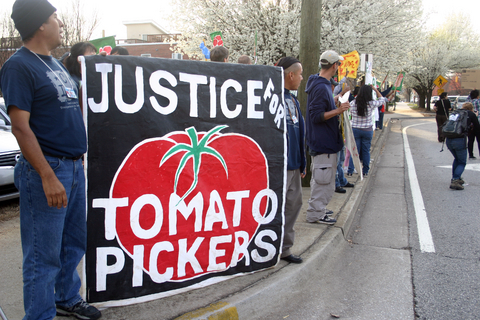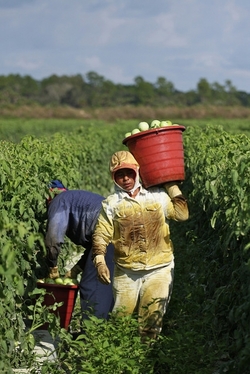Starting in childhood, we are encouraged to make wishes during the holidays. As kids, these are usually for gifts. As an adult, I find myself wishing for more substantive things. OK, every once in a while I wouldn't mind seeing a new pair of hiking boots waiting to be unwrapped. But at this time of year, my wishes are not necessarily for myself.
After all, I've got more-than-adequate food and shelter. And I also have a great job. As the vice president of strategy for Bon Appetit Management Company -c a food service provider committed to a sustainable future for us all -- I get to work on issues that are important to me and to make changes that I think are meaningful.
But one of those issues still needs addressing, and I can't do it alone. And despite our spending power of over $75 million a year for produce, my company can't do it alone, either.
Which brings me to my holiday wish: that by the end of this column, you will be moved to action and help make real, lasting change in the lives of the people who harvest this country's food. Or at least think about the real cost of that seemingly cheap winter tomato from Florida.
In order to make informed decisions about sourcing the vast quantities of produce we buy, I've tried to learn as much as I can about food quality, farming practices, and worker conditions by visiting farms and ranches of all sizes.
In April 2009, I was invited to Immokalee, Florida, by the Coalition of Immokalee Workers (CIW), a community-based organization of mainly Latino immigrants working in low-wage jobs throughout the state of Florida. Immokalee is where 90% of the tomatoes sold east of the Mississippi in these winter months are grown. I contacted the management at one of the largest tomato growers in the region and set up a meeting. At that point, this particular grower was refusing to even acknowledge the CIW's existence.
I had them take me to a tomato field. The physical conditions in the tomato fields were extreme. No shade, oppressively hot, with workers running with many pounds of tomatoes on their shoulders. I stood there fully aware that these workers are routinely exploited and sometimes physically enslaved. I had seen the overcrowded worker housing.
I thought: "What in the world am I going to do or say that will make a difference?"
CIW plants seeds of change
I was reminded of my first encounter with CIW, which was hearing Lucas Benitez speaking in Civic Center Plaza in San Francisco at 2008's Slow Food Nation. He spoke completely in Spanish (with an interpreter present) and told the story of how CIW had gotten the attention of Taco Bell and, later, an agreement from them to pay more for tomatoes and to ask growers to sign a basic code of conduct. I realized that this man -- this immigrant farmworker -- had moved a mountain, despite he and the executives at Taco Bell literally not speaking the same language.
As I learned more about the CIW itself, I further realized that this group of workers has no inherent power -- they don't have the legal right to unionize; they have very little money; most can't vote. They are also seen as interchangeable: one leaves, another replaces her. There are always others behind them willing to do the job.
When they initially went to the growers to fight for better conditions, the growers said "The tractor doesn't tell the farmer how to run the farm." So instead of accepting that, they turned their efforts to a bigger, more powerful target: huge multinational corporations.

They did this in part via the Campaign for Fair Food. Begun in 2001 by the CIW, the Campaign for Fair Food is designed to reverse the corporate food industry's practice of, in CIW's own words, "leveraging its buying power to demand the lowest possible prices from its suppliers, in turn exerting a powerful downward pressure on wages and working conditions" on farms.
The campaign's first major success was securing agreement from Taco Bell -- following a CIW-led national boycott of the chain -- to improve wages and working conditions for Florida tomato pickers. In 2007, they reached a similar agreement with McDonald's, and in 2008, with Burger King, Subway, and Whole Foods Market. I am proud to say that in 2009, following my visit, Bon Appétit became the first food service company to join the movement.
Since that day, I've seen real change -- positive change -- happen. Here's one example:
In the past, farm labor contractors sent buses to parking lots in Immokalee to pick-up day laborers at a call time of 5 or even 4 a.m. These buses then drove an hour or more to the farms themselves. If the workers arrived and the tomatoes were too wet to pick, the workers sat. And sat. And waited for the tomatoes to dry...unpaid.
As a result of the CIW's hard, public work since 1993 -- everything from the boycotts to hunger strikes to an "anti-slavery" campaign that freed over 1,200 workers from imprisonment and forced labor -- the call time is now 9 a.m. At 9 a.m., on many days, the sun has dried the evening dew from the tomatoes, and they are able to start work right away. No more dropping their kids off at a neighbor's or relative's at 3:30 in the morning: families are able to have breakfast together, or walk their kids to school.
I love this example of how things have changed for the Immokalee tomato pickers because it means that not only have their own lives been positively affected, but so have the lives of their families.
Our wish
For every farmworkers' rights success story we have, there are likely a hundred or more stories with no happy ending in sight. This is a complex problem that requires complex solutions.
That's why I invite you to share in my holiday wish for better conditions for America's farmworkers and to help it to come true. Here's how:
Tell your grocer that you want change.
By signing onto the Campaign for Fair Food, grocers agree to pay an additional 1.5 cents per pound for tomatoes (of which workers get 1 cent). It costs that little to make real change for farmworkers in the Immokalee region.
The Campaign is not just about money. The large buyers signing on agree to hold their suppliers accountable for following a strict code of conduct, offering a cooperative complaint resolution system, a health and safety program (quite important in a pesticide-heavy business), and a worker-to-worker education process. The money is critical, but I've seen personally that those commitments really protect and empower the workers.
Please take the time to reach out -- via letter, Twitter, Facebook or phone -- and tell your grocer that you care about farmworkers' rights and encourage them to join the Campaign for Fair Food. Here's a link to help you do just that:
This is just a start. But as I discovered after standing in those tomato fields, it's hard to un-learn things. Grocers and other large food buyers who take this first step will have their eyes opened, as I did, and will only go forward, not backward.
If we all agree to share in this holiday wish together, we will make real, permanent, positive change in the lives of thousands of farmworkers in Florida -- and eventually, I hope, the entire country.
